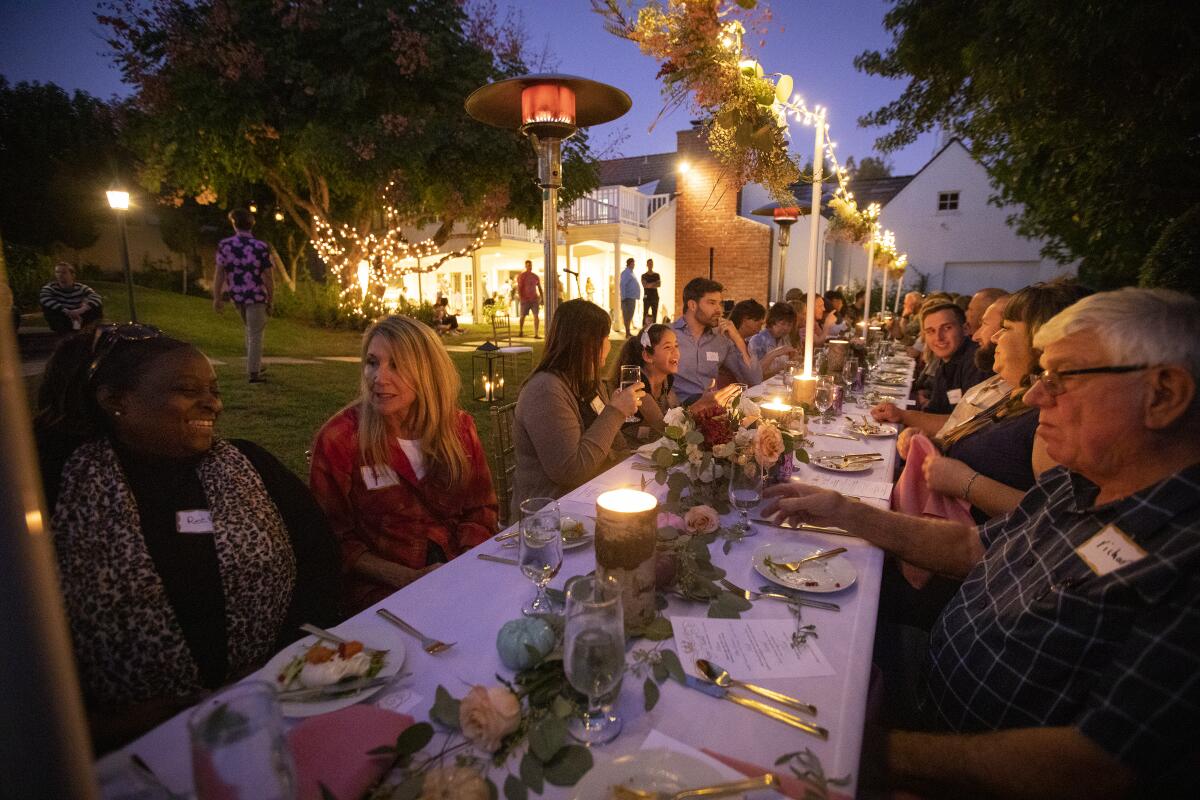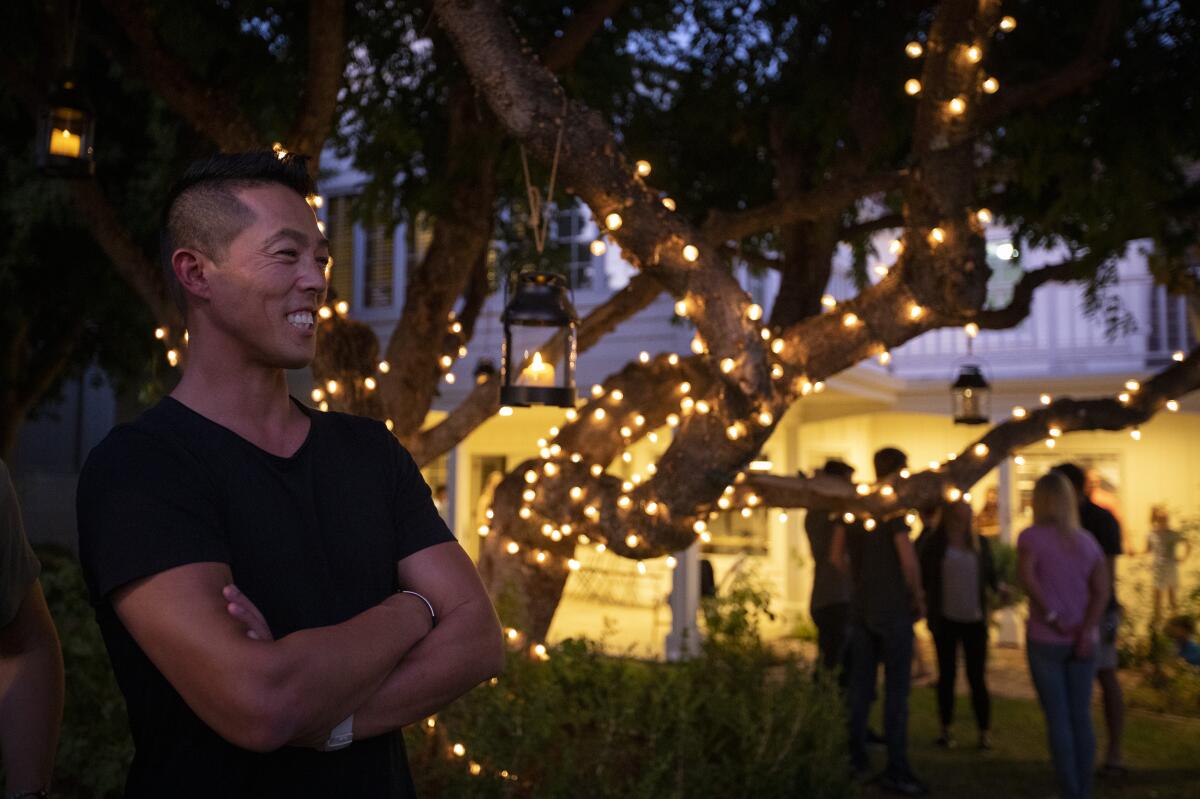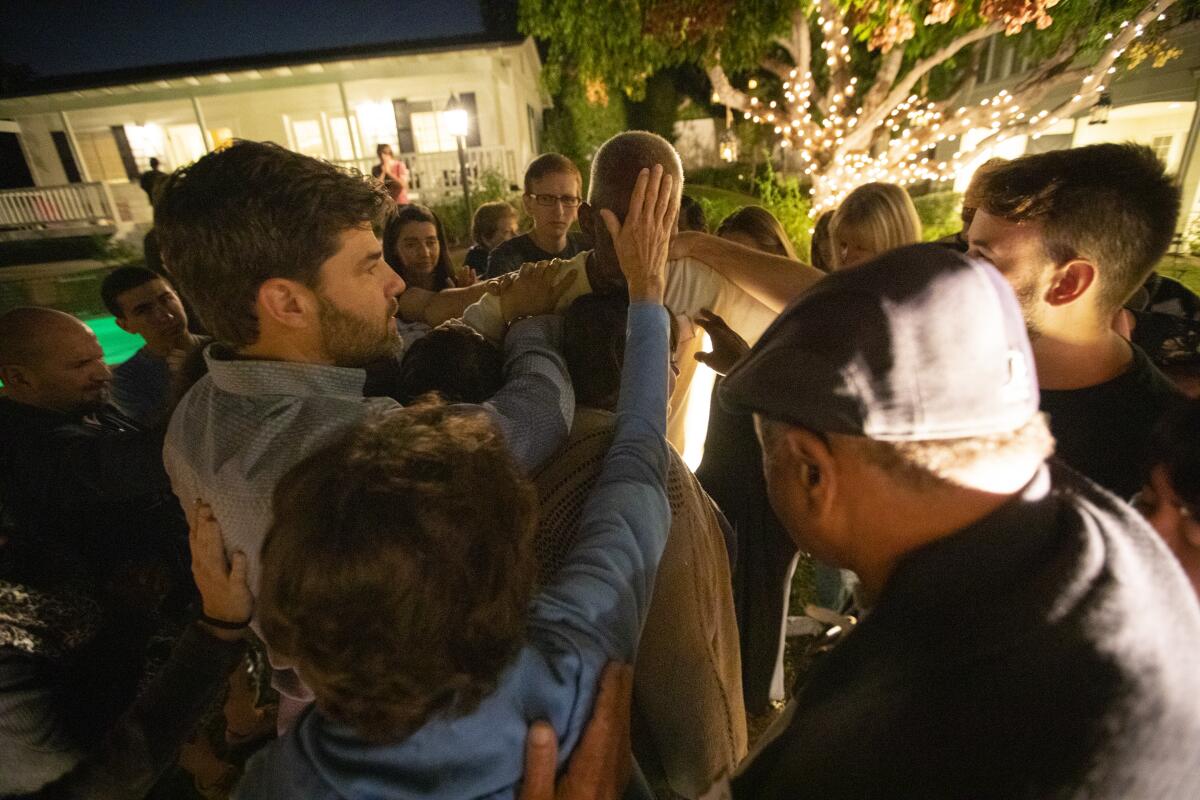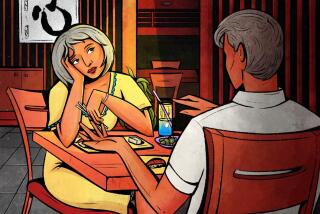Homeless people are served a five-course dinner at an O.C. home. It’s about dignity and human connection

- Share via
I was invited to a dinner in a small, well-heeled city near Anaheim. I drove along serene, gently curving roads, past homes with green-velvet lawns.
Arriving, I walked up a driveway and entered a backyard featuring a banquet table of the sort you’d expect at an elegant wedding.
There were gilded bamboo chairs and floral centerpieces and candles that looked like they were made out of birch. Menus printed with fancy calligraphy had been placed on the plates. Crab bisque, mocha mousse cake with cocoa nib ice cream — the feast would be five courses long.
I wasn’t the star attraction. Neither was the food, the event’s main organizer stressed to staff gathered on the porch.
“What’s special tonight is the connections ... the friends becoming family,” he told them.
A few minutes later at this gathering called the King’s Table, those friends arrived in shuttle vans — from a homeless shelter six miles and a world away.
Did I mention that the staff was entirely volunteer as was the chef, who had donated the food? Or that all of us wore name tags that let us slip quickly over any first-meeting awkwardness?
As the guests appeared, everyone instantly was on a first-name basis. “Hi, Nita,” people called out as they saw me. Some pulled me in for hugs. The same thing was happening everywhere I looked.
And by the time the trays of oysters and stuffed mushrooms were empty, people were deep into sharing their stories.
I had met Brian Whitmore, who told me he’d been in the shelter three weeks after “self-destruction” in the form of drinking had cost him the job he’d held for 17 years as an Albertsons grocery clerk. And David Foster, 61, who said he’d had a good career for 25 years in medical billing, collection and coding before losing his job four years ago because of pain that made it necessary for him to take a lot of breaks, which was belatedly diagnosed as spinal stenosis. Reeta Johnson, 47, had lived on a Fullerton bench for more than four years before she got to the shelter.
“When it comes to being homeless, it’s about not having support,” she told me. She said she’d had very little from anyone her whole life.
I have written quite a bit about my feeling that we as a society need to grow our compassion and empathy for those who do not have homes. I believe that doing so can help us mobilize more effectively to tackle the enormous, growing and complex crisis of homelessness.
That of course, front and center, means putting pressure on politicians — who have the greatest power to effect change — and demanding that they come up with plans and money to provide services and treatment and many different forms of housing as efficiently and quickly as possible.
It also means persuading our fellow citizens to make room in their hearts and in their own neighborhoods for the housing and other infrastructure we’ll have to provide to start making a dent.
It is partly in this second sphere, I think, that efforts like the King’s Table can nudge. But the dinners also are about something deeper.
They’re about straightforward, human-to-human offerings of encouragement, help and hope. Because not everything can come from a government program.

That organizer I just mentioned? His name is Lambert Lo — and he and his wife, Line (pronounced Lynn), who live in Santa Ana, began these dinners for the homeless five years ago. They’ve been held at churches and businesses and have just recently branched out into homes. The model has even spread abroad.
The name the couple gave the effort expresses how they want the dinners to feel.
“When you think of a king, you think of abundance and the finest and royalty,” Lo told me. “We want everyone at the King’s Table to be treated like royalty.”
Lo said he thinks of the dinners as a “doorway” to lasting friendships and stronger support systems and sometimes to very concrete assistance.
In the house, I met an example of this in John Park, the chef of Toast Kitchen & Bakery in Costa Mesa, and a member of his crew, Clarence Williams. Williams met Park when he was a guest at a King’s Table dinner a year ago. Now he’s working for him and recently found housing.
Lo, 43, was dressed this early November evening in an elegant casual style. He wore a black T-shirt, black pants, pristinely white Nikes without socks. He looked like the celebrity surf instructor he is. Over the years, he has coaxed big names, including Bill Murray and the late Steve Jobs, onto the waves.
But year after year, he told me, his outreach work to the homeless and the poor has taken over more and more of his life. In February, he began running the compassion ministries for his church, Vineyard Anaheim, which has a big food pantry set up like a supermarket and describes its mission as “stepping into the story of God for the sake of the city.”
Half of the 30 people seated at the King’s Table itself were from the Anaheim shelter. The other half were volunteers, who on this night mostly came from the church. I walked around eavesdropping on complicated stories involving addiction and abuse and hardship, words of encouragement, laughter, exchanges of emails and phone numbers.
And as adults ate, children ran around the yard, squealing and playing. Volunteers are encouraged to bring them.
“Homeless people, they so often see parents pulling their kids out of the way as they walk down the road. Here, the kids are smiling. They’re welcoming. They get to remember when it was normal,” Lo said. “This is not a feed. Feeding the homeless, that’s not new. What’s new is sitting together and being together as a family.”
By the time the dinner — which featured not just one but two desserts — was over, a lot of people at the table were acting as if they’d known each other for years. Lo urged anyone who wanted to come up and tell his or her story. Foster did. So did Johnson, who also sang a spiritual song she said had given her sustenance on that park bench for so long.

And everyone who spoke was then encircled by the crowd, with people opening their arms and offering prayers and blessings.
When I had first arrived at the Villa Park home of Sean and Jessica Ward, I couldn’t stop gazing at the home next door, which looked like a plantation house. A multi-tiered fountain burbled away in the front garden. A sparkling chandelier lit the portico.
There are so many ways in which a dinner for the poor in a neighborhood for the rich could feel wrong —only somehow here it mostly didn’t at all. The strength of the welcome, the extraordinary warmth was a big part of that.
Johnson told me after the evening that she had just one slight note. The dinner was outside in the garden. Guests used the facilities in a small cottage next to the pool.
“I love the idea of going to somebody’s house,” she told me. “But I would love it even more if you would invite me in and show me around.”
Still, she said, the open-hearted generosity felt to her rare and “really, really nice.”
As for Lo, he said he hoped my account of the dinner might convey a simple message: “You can’t do everything, but you can do something.”
More to Read
Sign up for Essential California
The most important California stories and recommendations in your inbox every morning.
You may occasionally receive promotional content from the Los Angeles Times.










